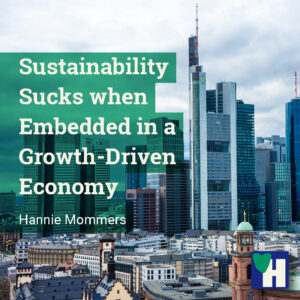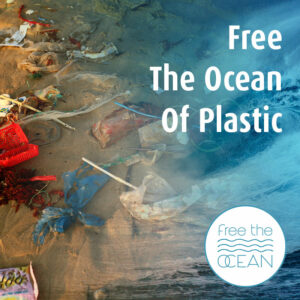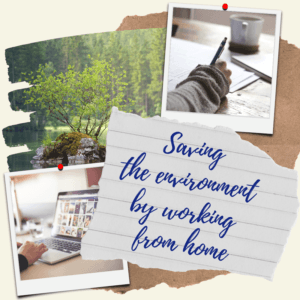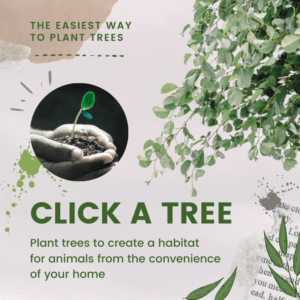
Through discussions, much reading, and writing, I sharpen my mind about the state of the earth. More and more I come to the conclusion that it is almost impossible to be sustainable.
In other words, sustainability sucks when embedded in a growth-driven economy.
But as one of my current sources of inspiration Thomas Rau says: “Let’s do what is necessary, not what is feasible.”
This article is a bit more negative in tone than my other articles but is a way to deepen my thoughts, and hopefully yours, and to keep or regain hope.
Some of the links are affiliate links. As an affiliate associate, we earn a commission when you purchase any of the products offered through the shared links at no extra cost for you. This helps us maintain this website.
Table of contents
Sustainability sucks
The economy we live in is growth-driven. When we become more efficient, consumption gets cheaper. In an economy based on unlimited growth, we consume more and waste more. This ongoing process will always hurt the environment.
The devaluation of the word sustainability

Regularly, I have discussions with my son about sustainability. He admires Richard Branson’s entrepreneurship, but then he learned that I thought Branson’s space travel was ridiculous.
After thinking about it, he agreed with me. That space trip made no sense. “But Mom, Branson also does a lot for the environment and is concerned with sustainability!”
At that point I got angry. How can someone pollute space, squander an enormous amount of fuel and materials, and still say that sustainability is important to him? Ridiculous.
Most technological solutions are not sustainable
I already expressed some of my doubts in my article about the relationship between sustainability and technological innovations. People take little effort towards sustainability because they think technology will solve all problems.

However, new solutions cause new problems. ICT was introduced as a technological solution to solve all the world’s problems. As it turns out, ICT only adds to the problems.
Moreover, there are many more technological ‘solutions’ that rarely keep their promises. Nuclear power, alternative animal feed, and lab food are examples of technological ‘solutions’ I don’t trust.
As much as I dislike greenwashing.
Related: Why is Digital Sustainability Important? 11 Conscientious Tips to Help You
Greenwashing is lurking
Many companies are piggybacking on the green wave and supposedly make a good impression with their sustainable approach.
C&A Spain sells organic cotton clothing and offers its customers a paper carrier bag at the checkout. In the meantime, the entire store is full of plastic decorations and plastic clothing on plastic hangers, with that one rack of organic cotton dwarfing insignificance.
MacDonald’s is exaggerating its sustainable approach by drawing attention to its paper placemats and paper cups and plates. Not a word about the unhealthy food and the animal-unfriendly treatment of the livestock used for the burgers.
Not to mention the companies that do nothing sustainable, but do state on their packaging that the product is 100% natural and contributes to our health.
I warned you, this article will not portray my optimistic side. 🙂
Related: How can Shopping be Sustainable? Tips and Best Practices
A narrow view leads nowhere

On a website, I read this: “Even crappy stuff can be sustained for a really long time” (Source: Resilience). That article was one of the sources that led me to mine, and is mainly about the devaluation of the word itself.
Another article, published on Aljazeera, points out that narrow-minded development of a sustainable campus can be devastating for the area around that campus.
With much fanfare, a science campus has been built in Montreal in a sustainable way. The poor neighborhood around the campus had to hitch a ride on the pace of development. It’s called the gentrification of a city.
The result is indeed a facelift. Hip cafes and shops have replaced boarded-up and poorly maintained buildings.
As a result, the price level has also risen, which has driven the original residents and local shops away to other poor neighborhoods.
Related: Poverty in the World and Sustainability, a Tense Relation
Is sustainability possible?

A sustainable society is one that is able to maintain itself and develop without exhausting its natural resources. The UN defines sustainable development as development that meets the needs of the present without compromising the ability of the next generation to meet their own needs.
However, “the needs of the present” are different for the various population groups. Sustainability is fast becoming an expensive status symbol.
Energy prices are rising rapidly all over the world, which is especially a disadvantage for those who have not been able to invest in insulation, double-glazed windows, or solar panels.
Organic food is usually more expensive than the watery, poisoned supermarket offerings. As long as politics is guided by the lobbies of the multinationals, our individual efforts are a drop in the ocean.
Related: What is a Sustainable Lifestyle and How We Can All Achieve this
Small steps are nice, bigger are required

Tom and I have written a lot about sustainability. Given our personal experiences, we are very aware of how difficult it is to live according to even the most simple sustainability principles.
Actually, from our experiences, we know that sustainability does not offer simple principles, let alone simple solutions. This is illustrated in one of my most elaborate articles about the principles of sustainability.
In the article, I introduced 4 basic sustainability fields of interest, each containing 6 principles. This means that when aiming for sustainability, at least 24 principles have to be taken into account.
The result is that on an individual level, only small steps can be made. However, governments and companies are required to take bigger and more serious steps forward. They must lead by example.
Related: Basic Principles of Sustainability: What Should we Pay Attention to?
Sustainability sucks, but it’s a prized challenge

In many of our articles, we introduced suggestions for the small steps we can make to turn the tables on the planet where we live. To reduce greenhouse gas emissions. Support biodiversity. Improve the welfare of animals.
The most significant small steps we can make are to reduce our meat consumption, to buy and eat organic food, and to use public transport more often.
The biggest challenges of these small steps are perseverance (to sustain even the smallest of steps), avoidance of the overtly negative comments of others, and keeping an open eye on the good conscience of like-minded people.
Related: How to Feed 10 Billion People on the Earth Sustainably?
What are your thoughts about the sustainability challenge? Tell us in the comment box below.

C&A along with many other clothing manufacturers, both big and small, are riding this whole organic clothing ‘trend’ for their own benefit. The factories where their clothes are produced have nothing sustainable about them not to mention the fact that they exploit their workers.
I am afraid you are right, Andrew. The bigger the company, the more exploitation. 🙁 It breaks my heart, every time I read about a factory burn or collapse in Bangladesh.
All we can do is try to buy as sustainably as possible. If a piece of clothing is very cheap, we can be sure somebody else is paying a price.
Thanks for your comment and take care.